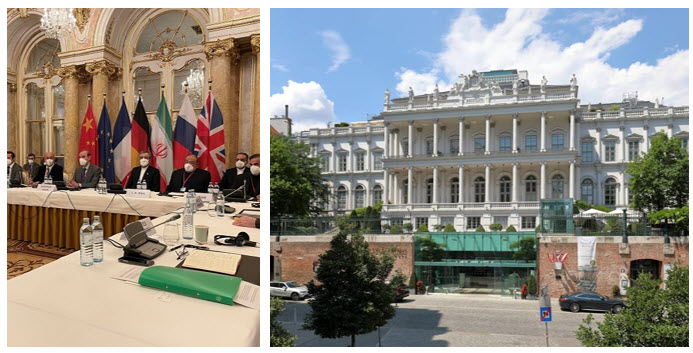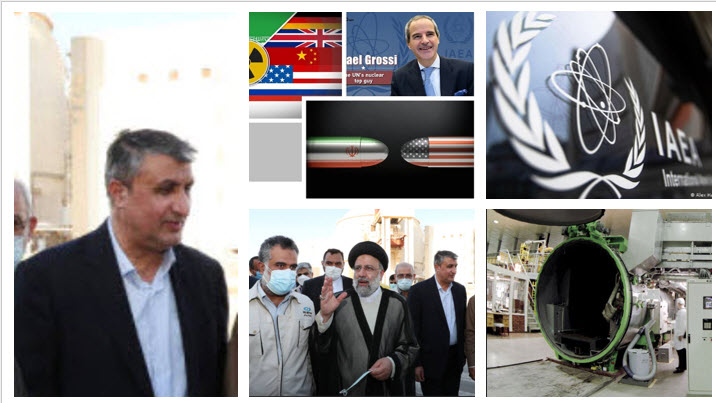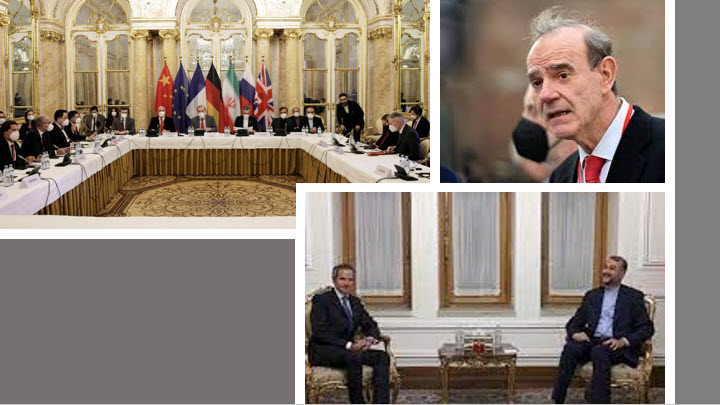
Tehran has erected additional “cascades” of advanced centrifuges that may dramatically speed up the process of enriching uranium to weapons-grade levels.
On Monday, the Iranian regime maintained its grip on negotiations with six world powers over its nuclear program, when Foreign Ministry spokesman Saeed Khatibzadeh dismissed the idea that ongoing talks in Vienna might result in an interim agreement that prevents the 2015 Iran nuclear deal from collapsing but does not restore full compliance. Since 2018, when then-US President Donald Trump suspended participation and began reimposing and extending economic penalties, the accord has been on life support.
Tehran would have to start talking in “good faith”
Despite the fact that the United Kingdom, France, Germany, Russia, and China remained members of the Joint Comprehensive Plan of Action, Tehran quickly began breaking its pledges and pushed the country’s nuclear program to levels of uranium enrichment that were previously unheard of. Tehran has also erected additional “cascades” of advanced centrifuges that may dramatically speed up the process of enriching uranium to weapons-grade levels, as well as producing small amounts of uranium metal, a substance with almost no practical use other than as a component of a nuclear weapon.
All of this has added to public worry about Iran’s “breakout” window for nuclear weapons capacity, causing US, UK, France, and German officials to warn that time was running out for the Vienna talks, and that Tehran would have to start talking in “good faith” to save them.

Public worry about Iran’s “breakout” window for nuclear weapons capacity, causing US, UK, France, and German officials to warn that time was running out for the Vienna talks.
If there is any sign of change would come from Tehran
If there is any sign of change coming from Tehran, it is Khatibzadeh’s statement that progress was made on “all four issues” during the most recent round of talks in Vienna, the second since the overall process resumed in late November after a five-month pause initiated by selected president Ebrahim Raisi. So far, his administration has stated that the latest talks will be purely focused on one topic: the easing of sanctions. However, the Foreign Ministry spokesman named “nuclear problems” as one of the topics of discussion while explaining his version of recent progress.
However, this is unlikely to be seen as a big compromise by the regime’s critics. The three other points raised by Khatibzadeh were all variants of the regime’s main demand. He said that “excellent progress” had been made in “removing sanctions” and providing Tehran with “verification” and “guarantees” about the relief’s impact and permanence. Unlike Khatibzadeh, who framed the alleged development as “the consequence of all parties’ efforts to establish a stable agreement,” his Foreign Ministry supervisor used a more aggressive tone when talking on the same subject.

The Raisi administration has stated that the latest talks will be purely focused on one topic: the easing of sanctions.
During 6 weeks of talks, nothing appears to have changed
Hossein Amir-Abdollahian, the regime’s foreign minister, credited “the Iranian side’s actions” with persuading Western powers to lower their demands. He claimed that during past rounds of negotiations, French negotiators had played “the bad cop,” but that they were now “behaving reasonably.” He also boasted that the US was admitting the “reality” of the situation that underpins the negotiations, meaning that the regime has more negotiating leverage than previously admitted.
In the more than six weeks since the Vienna talks commenced, nothing appears to have changed significantly, at least not in ways that benefit the Western negotiating parties. Indeed, US officials spoke with their South Korean counterparts around the time of Iran’s demand for unfrozen assets, sparking speculation that the White House was on the verge of defying all of Tehran’s most serious critics’ advice and making new, undeserved concessions as a way of keeping the clerical regime present at negotiations that have been treated like a cat and mouse game, as Iranians call it.

The regime’s foreign minister, credited “the Iranian side’s actions” with persuading Western powers to lower their demands.
MEK Iran (follow us on Twitter and Facebook), Maryam Rajavi’s on her site, Twitter & Facebook, NCRI (Twitter & Facebook) and People’s Mojahedin Organization of Iran – MEK IRAN – YouT

